Table of Contents
- Leveraging Influencer Marketing to Drive e-Commerce Sales
- Why Influencer Marketing Works in Social Commerce
- How Influencer Marketing Empowers e-Commerce Businesses
- The Rise of Social Commerce
- Crafting a Winning Influencer Marketing Campaign: A) Define Your Goals and Target Audience, B) Find the Right Influencers, C) Develop a Collaborative Content Strategy, D) Enhance Social Commerce through Influencer Affiliate Programs, E) Monitor and Measure Campaign Success
Competition can be fierce in the ever-evolving e-commerce landscape. Consumers are flooded with choices, and capturing their attention requires innovative strategies for modern audiences.
Enter influencer marketing, a potent tool harnessing the power of social media personalities to boost brand awareness and, ultimately, sales. By partnering with the right influencers, you can tap into a ready-made community built on confidence and enthusiasm, propelling your e-commerce brand toward success.
This guide illuminates the synergy between influencer marketing and social commerce, a powerful combination that seamlessly integrates product discovery and purchase within the social media ecosystem. We’ll explore the dynamic world of influencer marketing for e-commerce, highlighting its core principles and outlining actionable steps for crafting a winning campaign.
Why Influencer Marketing Works
 Street Style photograph in which two girls with long hair and winter clothes walk around smiling and looking at their mobile phone screens.
Street Style photograph in which two girls with long hair and winter clothes walk around smiling and looking at their mobile phone screens. Consumers today crave authenticity and meaningful engagement from the brands they support. While still relevant, traditional advertising often struggles to forge a genuine connection with its intended audience.
Influencer marketing can succeed where conventional strategies fail by leveraging the clout and credibility of social media personalities. These influencers produce entertaining and compelling content and have cultivated dedicated followers who value their opinions and trust their recommendations.
Ultimately, when an influencer promotes your product, it's not just advertising — it's a faithful friend sharing a positive experience with a brand they believe in.
- Trust Audience Reach: Typically, influencers cultivate specific audience demographics and interests, allowing companies to reach their ideal customers directly..
- Engaging Content Creation: Influencers excel at creating engaging, visually appealing content that resonates with their audience. This content can showcase products more effectively and generate excitement for brands.
- Social Proof and Advocacy: When influencers endorse a product, it lends credibility and social proof, inspiring brand loyalty and impacting purchase decisions.
How Influencer Marketing Empowers e-Commerce Businesses
Influencer marketing empowers e-commerce businesses by building a meaningful connection with potential customers. Leveraging the relationship between social media personalities and their followers can be a highly effective strategy to amplify your product offering, generate brand loyalty, connect with a broader audience, and increase sales.
- Increased Brand Awareness: Influencers with large followings can expose your products to a vast audience you might have yet to reach organically. This amplified reach broadens brand recognition and positions you as a leader in your niche.
- Enhanced Credibility: Consumers are more likely to believe a product recommendation from a relatable influencer over a traditional ad. Influencer endorsements add a layer of legitimacy, helping to develop trust and brand loyalty.
- Targeted Audience Engagement: Influencers typically cater to specific niches. By partnering with influencers whose audience aligns with your target market, you ensure your message resonates with the right people, maximizing the potential for conversions.
- Driving Social Commerce: Influencer marketing seamlessly integrates with social commerce platforms. By incorporating shoppable links or discount codes within influencer content, consumers can discover and purchase products instantly, creating a frictionless buying experience.
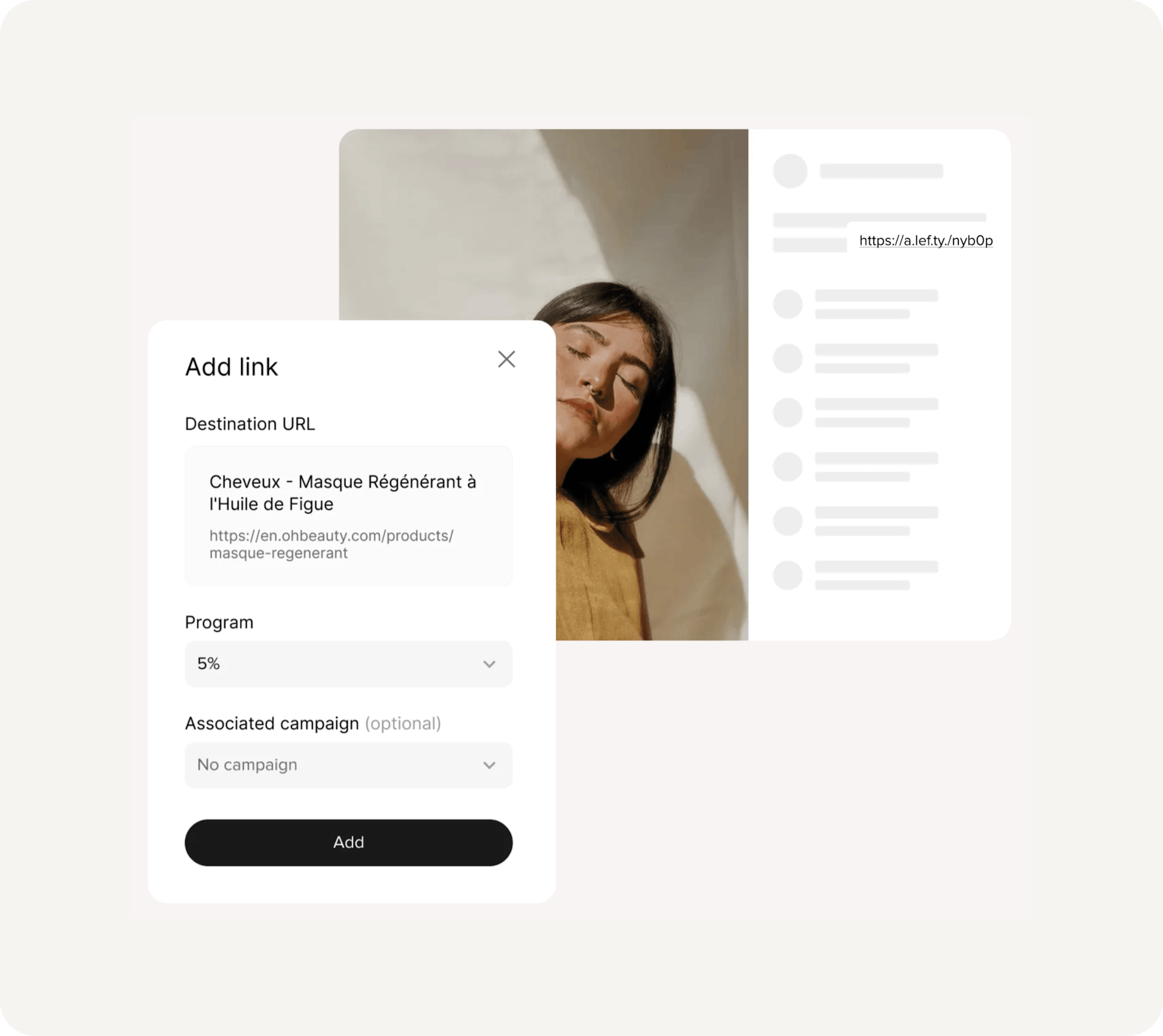 Illustration of a simplified lefty feature showing the "create and share trackable links and promo codes" option.
Illustration of a simplified lefty feature showing the "create and share trackable links and promo codes" option.Lefty supports your eCommerce strategy through unique, trackable links that seamlessly integrate into your eCommerce platform (or any other web property) for your affiliates to share.
The Rise of Social Commerce
Social commerce is revolutionizing the e-commerce landscape, with projections indicating the market will grow to more than $2 trillion US by 2025. Platforms like Instagram Shopping, Facebook Shops, and TikTok Shop have embraced this trend, allowing users to discover and purchase products directly within their apps. In 2023 alone, eMarketer reports that shoppers worldwide rely more on social networks to discover new products and buy them.
Combining in-app purchasing and e-commerce businesses is highly advantageous for e-commerce businesses as it eliminates the need to navigate to a separate website, creating a more convenient and immediate shopping experience for the user.
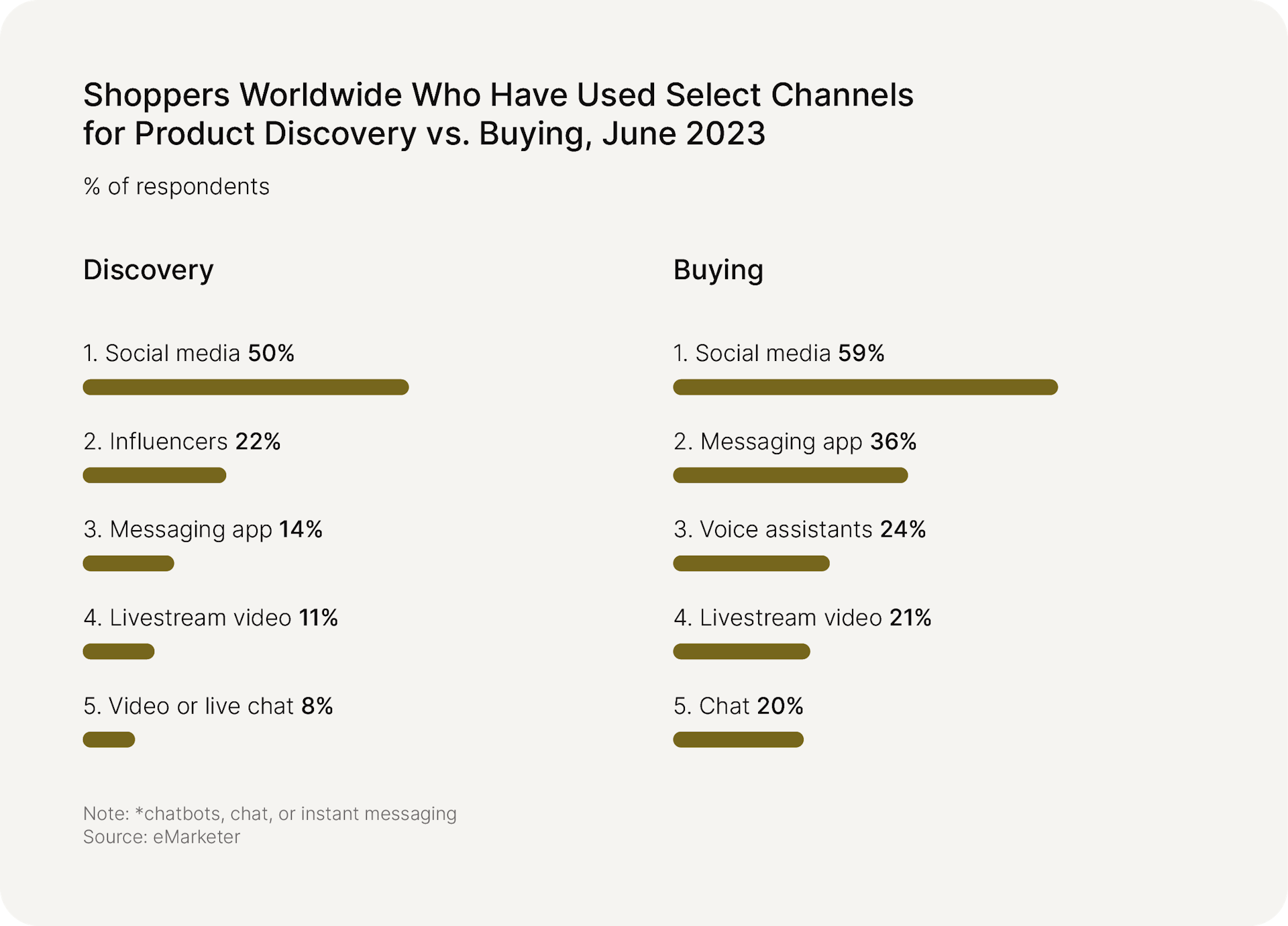 Chart from the eMarketer website titled ‘Shoppers Worldwide Who Have Used Select Channels for Product Discovery vs. It shows that in 2023 alone, eMarketer reports that shoppers around the world are relying more on social media to discover new products and to buy them.
Chart from the eMarketer website titled ‘Shoppers Worldwide Who Have Used Select Channels for Product Discovery vs. It shows that in 2023 alone, eMarketer reports that shoppers around the world are relying more on social media to discover new products and to buy them.Social commerce thrives using two key strategies to genuinely connect with consumers: user-generated content (UGC) and influencer marketing.
UGC lets real people showcase their organic experiences with your brand, but it may not involve the company’s input into the approach. Influencer marketing, in contrast, requires collaboration and incentives to ensure the final content aligns with your messaging and goals.
Influencer marketing plays a crucial role in the success of social commerce. When social media personalities showcase your brand, they provide real-world context and social proof, encouraging viewers to explore and ultimately purchase your products.
Next, we’ll dive into how to craft an effective influencer marketing campaign.
Crafting a Winning Influencer Marketing Campaign
Developing a successful influencer marketing strategy requires careful planning and execution. Here’s how you can get started building your next campaign:
1. Define Your Goals and Target Audience: Before jumping into any marketing plan, establish your campaign goals. Are you aiming to increase brand awareness, drive website traffic, or boost sales? Knowing your objectives will guide your influencer selection and direct your content strategy.
Next, define your target audience methodically. Understand who your ideal customer is and where they spend their time online. Choose influencers whose audience demographics align with your target market, considering crucial metrics such as demographics, interests, and online behavior. Understanding your ideal customer will help you identify the right influencers to reach them.
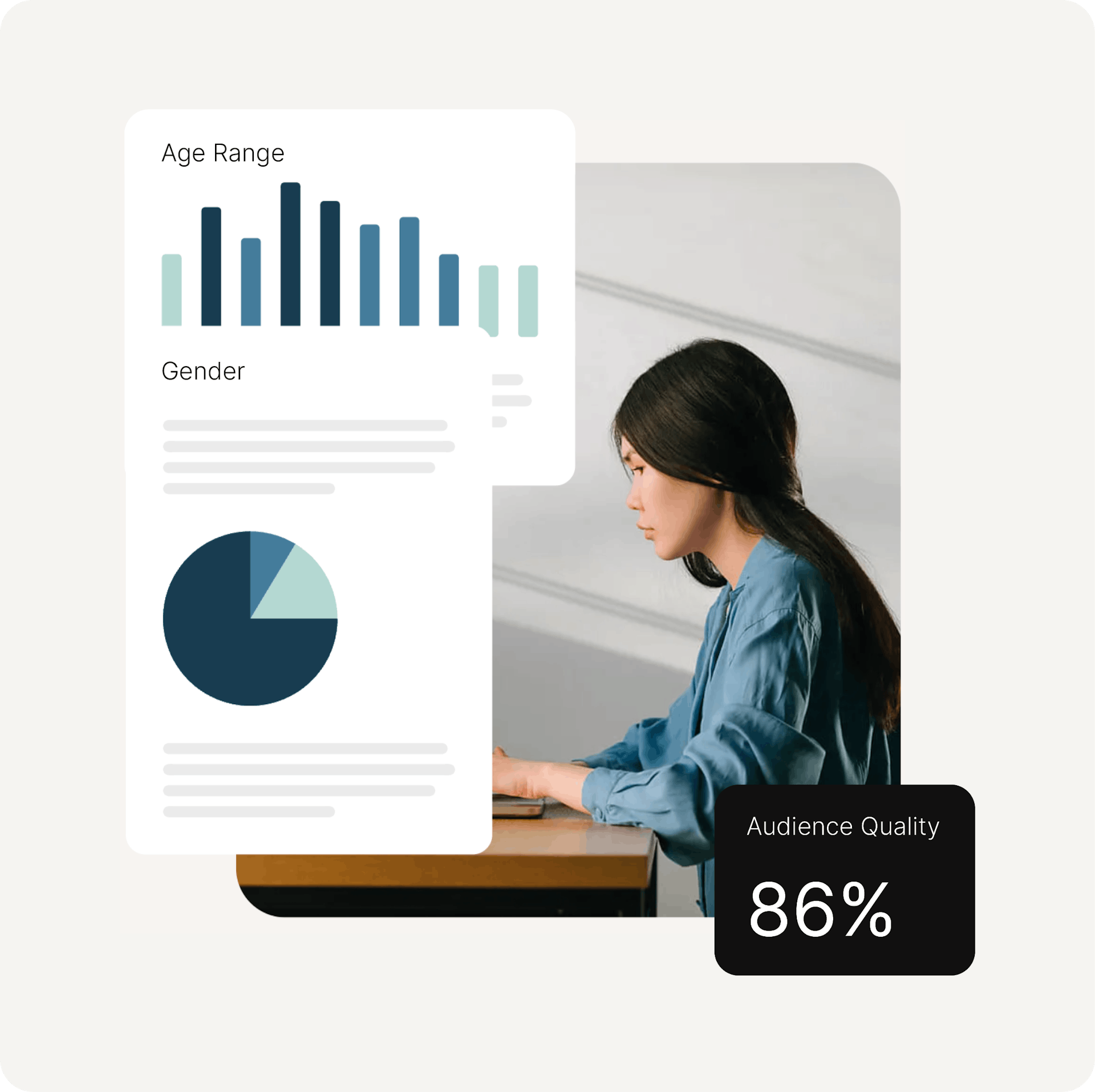 Illustration of a simplified lefty feature showing the insights with Lefty's internal consulting arm option.
Illustration of a simplified lefty feature showing the insights with Lefty's internal consulting arm option.2. Find the Right Influencers: Not all influencers are created equal. Look for individuals who embody your brand values and resonate with your target audience. Consider factors like:
- Niche Alignment: Choose influencers who operate in your industry or a closely related niche.
- Audience Demographics: Ensure the influencer's audience demographics closely mirror your target market.
- Engagement Rate: Focus on influencers with high engagement rates, indicating a genuinely interested audience.
- Authenticity: Partner with influencers who genuinely believe in your products and can create authentic content.
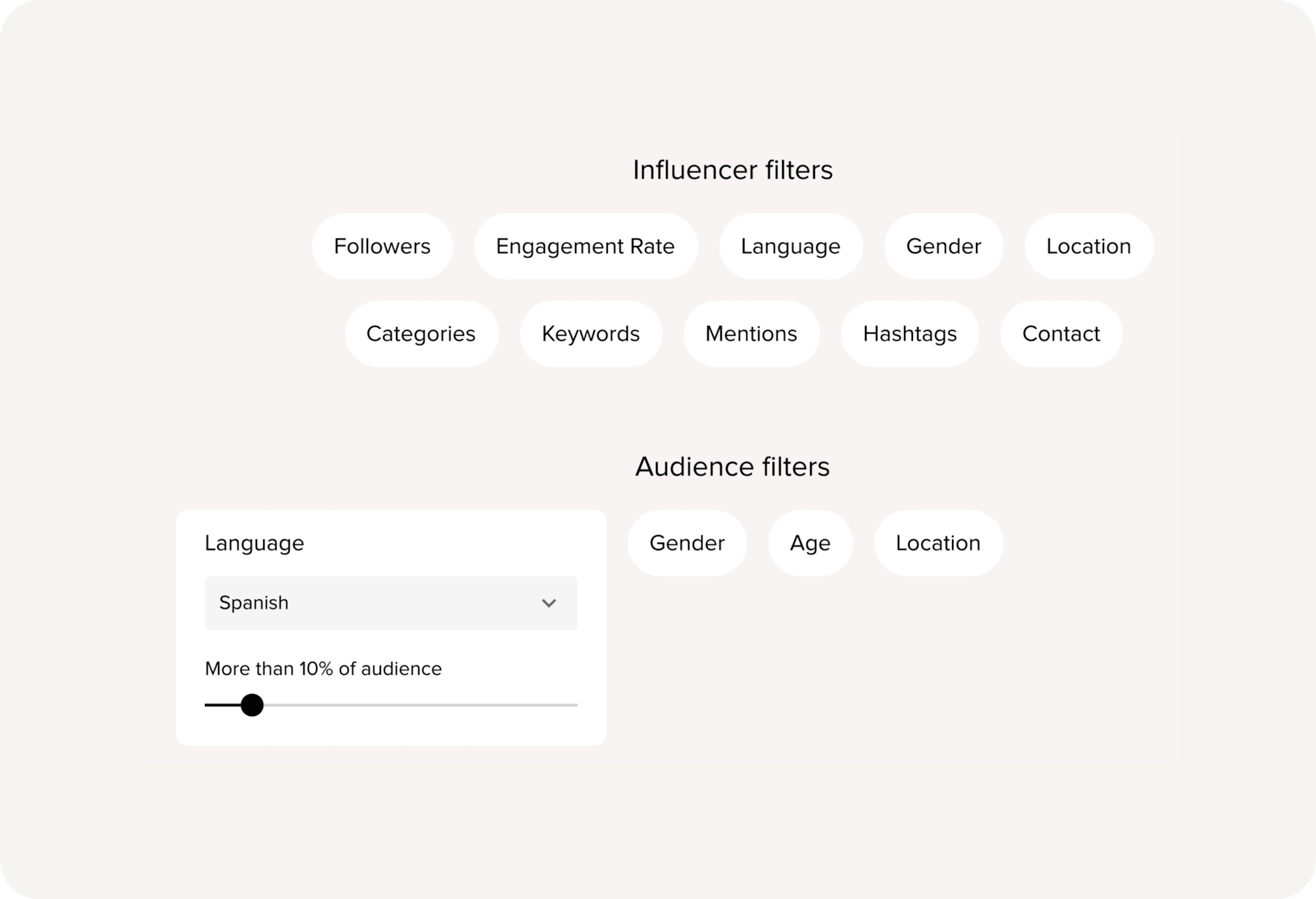 Illustration of a simplified lefty feature showing how easy is to find relevant matches with the smart filters the platform provides.
Illustration of a simplified lefty feature showing how easy is to find relevant matches with the smart filters the platform provides. Lefty’s influencer discovery tool outlines the parameters to pinpoint influencers that match your audience’s demographics.
3. Develop a Collaborative Content Strategy: Gone are the days of forced endorsements and ads that feel like ads. Collaborate closely with the influencer to design content that organically integrates your product into their style. This content could be:
- Product Reviews: Encourage the influencer to provide an honest and detailed review of your product(s).
- Unboxing Videos: Inspire the influencer to generate a sense of anticipation and excitement around your product(s) through an unboxing video.
- Tutorials and How-To Guides: Ask the influencer to demonstrate the benefits and practical applications of your product(s) with easy-to-understand tutorials or how-to guides.
- User-Generated Content (UGC) Campaigns: Empower influencers and their followers to create content featuring your products, fostering a sense of community and authenticity.
Live Shopping Events: Partner with influencers to host live shopping events where they showcase and sell your products in real time.
4. Enhance Social Commerce Through Influencer Affiliate Programs: Influencer affiliate programs provide a structured compensation framework for partnerships between e-commerce brands and social media personalities.
In this model, influencers are given a unique tracking link or discount code and earn a commission for each product sold. These programs incentivize influencers to actively promote your business and drive sales.
Benefits of Influencer Affiliate Programs:
- Performance-Based Model: An affiliate structure motivates influencers to achieve desired results, aligning their financial goals with your brand's success.
- Measurable ROI: Tracking conversions from unique affiliate links allows you to measure your influencer marketing campaign's return on investment (ROI).
- Scalability and Flexibility: Affiliate programs enable collaboration with a broader range of influencers, allowing you to tailor campaigns to specific marketing objectives.
5. Monitor and Measure Campaign Success: Once you’ve established a relationship with an influencer, develop a system for monitoring and measuring the efficacy of their campaign—track metrics like long-term activations, ad-hoc activations, and their associated content.
Collect All Influencer Publications and monitor their metrics: Create custom campaigns across multiple social networks with automated monitoring and reporting to track long-term activations, ad-hoc activations, and their associated content posted by influencers.
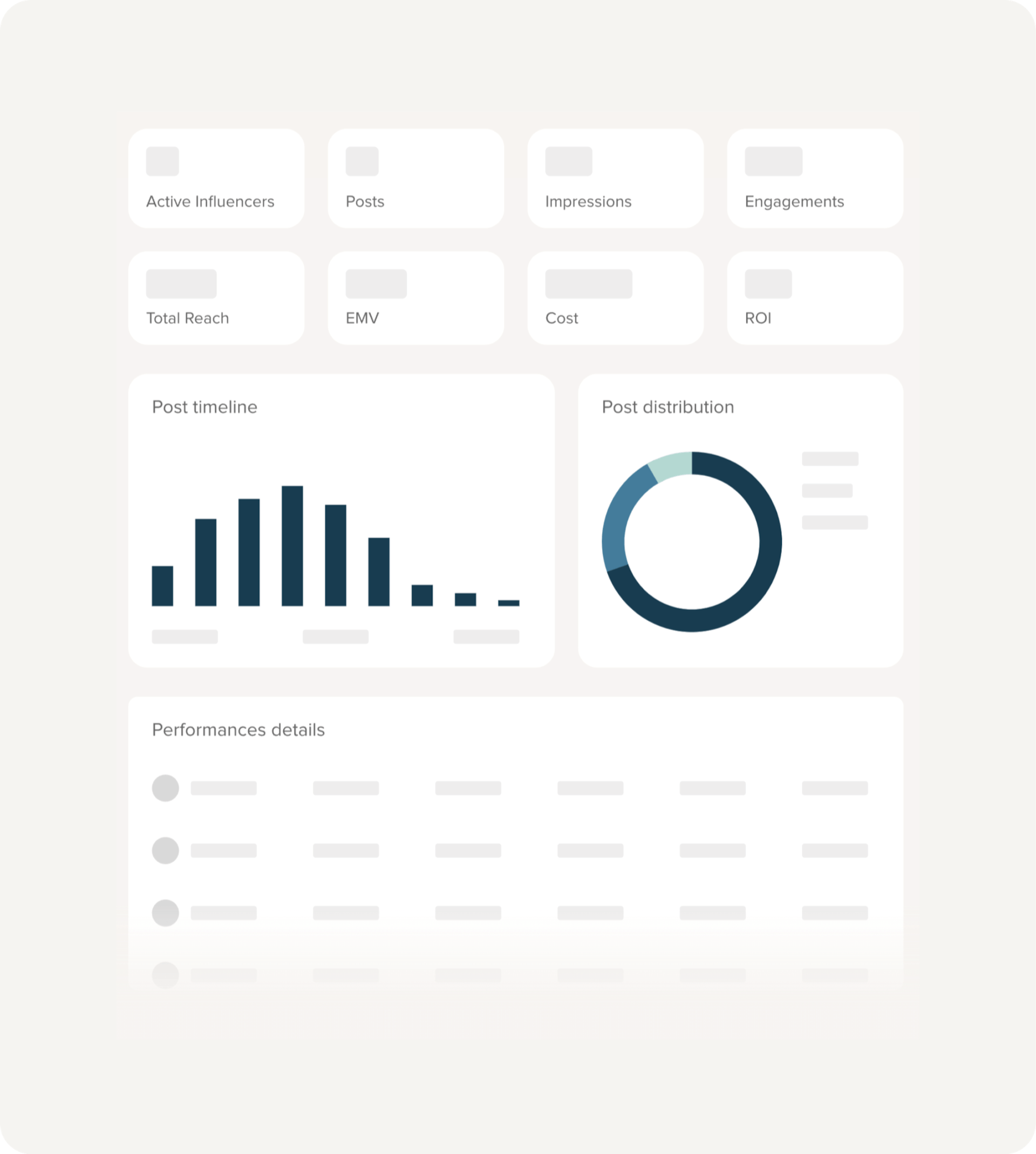 Illustration of a simplified lefty feature showing how to measure the impact of your campaign down to sales using Lefty.
Illustration of a simplified lefty feature showing how to measure the impact of your campaign down to sales using Lefty.Measure Campaign Success: consolidate the metrics generated by the campaign, reviewing top-line KPIs like:
- Return on Investment (ROI)
- Earned Media Value (EMV)
- Timeline of campaign impact
- Individual influencer and social network performance
- The demographics of the audience interacting with your campaign



